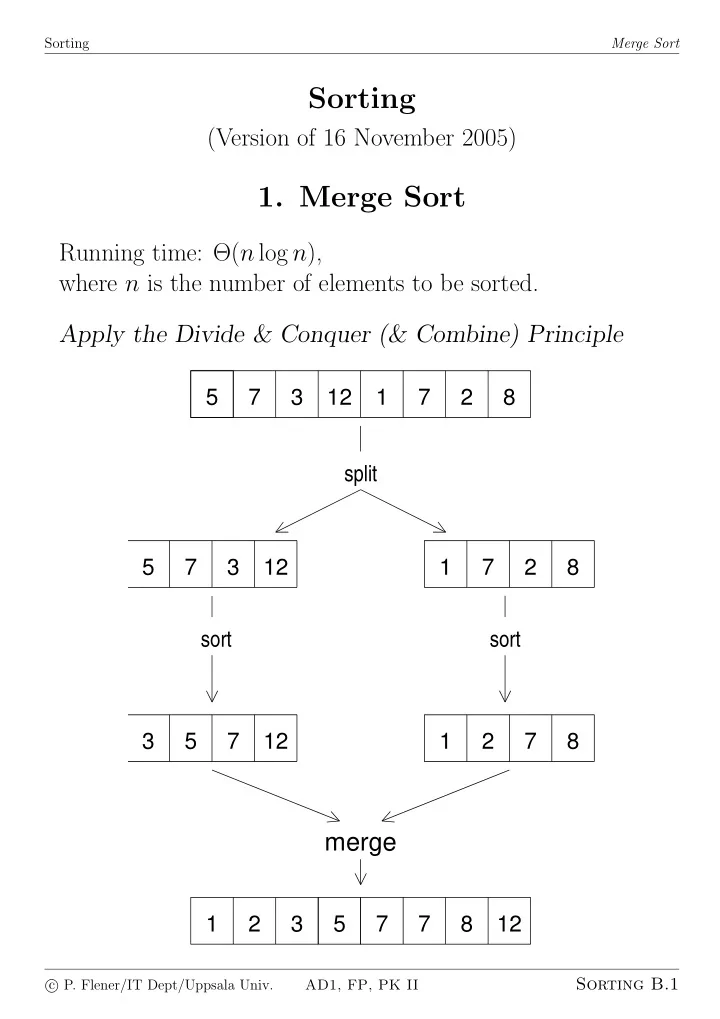

Sorting Merge Sort Sorting (Version of 16 November 2005) 1. Merge Sort Running time: Θ( n log n ), where n is the number of elements to be sorted. Apply the Divide & Conquer (& Combine) Principle 5 7 3 12 1 7 2 8 split 5 7 3 12 1 7 2 8 sort sort 3 5 7 12 1 2 7 8 merge 1 2 3 5 7 7 8 12 Sorting B.1 � P. Flener/IT Dept/Uppsala Univ. c AD1, FP, PK II
Sorting Merge Sort Merging two sorted lists 3 5 7 12 1 2 7 8 13 merge 1 2 3 5 7 7 8 12 13 Specification function merge L M TYPE: int list → int list → int list PRE: L and M are non-decreasingly sorted POST: a non-decreasingly sorted permutation of the list L@M Exercise Redo all the functions in this chapter for α lists. Sorting B.2 � P. Flener/IT Dept/Uppsala Univ. c AD1, FP, PK II
Sorting Merge Sort Construction Variant: length(L) · length(M) . (Exercise: try length(L) + length(M) .) Base cases If L is empty, then the result is M . If M is empty, then the result is L . General case Let L be x::xs and let M be y::ys . If x < y , then x is the minimum of L and M , and the result is x::zs , where zs is merge xs M . If x >= y , then y is the minimum of L and M , and the result is y::zs , where zs is merge L ys . Note that the recursive calls do satisfy the pre-condition, and that the variant does get smaller. SML program fun merge [ ] M = M | merge L [ ] = L | merge (L as x::xs) (M as y::ys) = if x < y then x :: (merge xs M) else y :: (merge L ys) Running time: O ( | L | + | M | ) Sorting B.3 � P. Flener/IT Dept/Uppsala Univ. c AD1, FP, PK II
Sorting Merge Sort Splitting a list into two ‘halves’ Specification function split L TYPE: α list → ( α list ∗ α list) PRE: (none) POST: (A,B) such that A@B is a permutation of L while A and B are of the same length, up to one element Note that the order of the elements in A and B is irrelevant! Naive SML program fun split L = let val t = (length L) div 2 in ( List.take (L,t) , List.drop (L,t) ) end • Running time: n + ⌊ n 2 ⌋ + ⌊ n 2 ⌋ = Θ( n ), where n is the length of L . • How to realise split with a single traversal of L ?! Sorting B.4 � P. Flener/IT Dept/Uppsala Univ. c AD1, FP, PK II
Sorting Merge Sort Merge sort Specification function sort L TYPE: int list → int list PRE: (none) POST: a non-decreasingly sorted permutation of L SML Program Variant: length(L) . fun sort [ ] = [ ] | sort [x] = [x] | sort xs = let val (ys,zs) = split xs in merge (sort ys) (sort zs) end Why is the base case sort [x] indispensable?! Sorting B.5 � P. Flener/IT Dept/Uppsala Univ. c AD1, FP, PK II
Sorting Quicksort 2. Quicksort A sorting method proposed by C.A.R. Hoare, in 1962. Average-case running time: Θ( n log n ), where n is the number of elements to be sorted. Application of the Divide & Conquer Principle 5 7 3 12 1 2 7 8 partition 3 1 2 7 12 7 8 sort sort 1 2 3 7 7 8 12 1 2 3 5 7 7 8 12 Sorting B.6 � P. Flener/IT Dept/Uppsala Univ. c AD1, FP, PK II
Sorting Quicksort Specification The same as for merge sort! SML program fun sort [ ] = [ ] | sort (x::xs) = let val (S,B) = partition (x,xs) in (sort S) @ (x :: (sort B)) end • Double recursion and no tail-recursion • Average-case running time: Θ( n log n ) • Usage of X @ Y (concatenation), which is Θ( | X | ) Help function: partition function partition (p,L) TYPE: int ∗ int list → int list ∗ int list PRE: (none) POST: (S,B) where S has all x < p of L and B has all x ≥ p of L fun partition (p,[ ]) = ([ ],[ ]) | partition (p,x::xs) = let val (S,B) = partition (p,xs) if x < p then (x::S,B) in else (S,x::B) end • Running time: Θ( | L | ) Sorting B.7 � P. Flener/IT Dept/Uppsala Univ. c AD1, FP, PK II
Sorting Quicksort Generalisation sorted S x sorted B A sort’ B A x :: (sort’ B A) function sort’ L A TYPE: int list → int list → int list PRE: (none) POST: (a non-decreasingly sorted permutation of L) @ A (Exercise: try POST: A @ (a non-decreasingly sorted permutation of L)) local fun sort’ [ ] A = A | sort’ (x::xs) A = let val (S,B) = partition (x,xs) in sort’ S (x :: (sort’ B A)) end in fun sort2 L = sort’ L [ ] end • Double recursion, but one tail-recursion • No usage of @ (no concatenation) • Average-case running time: again Θ( n log n ), but less space consumption Sorting B.8 � P. Flener/IT Dept/Uppsala Univ. c AD1, FP, PK II
Recommend
More recommend